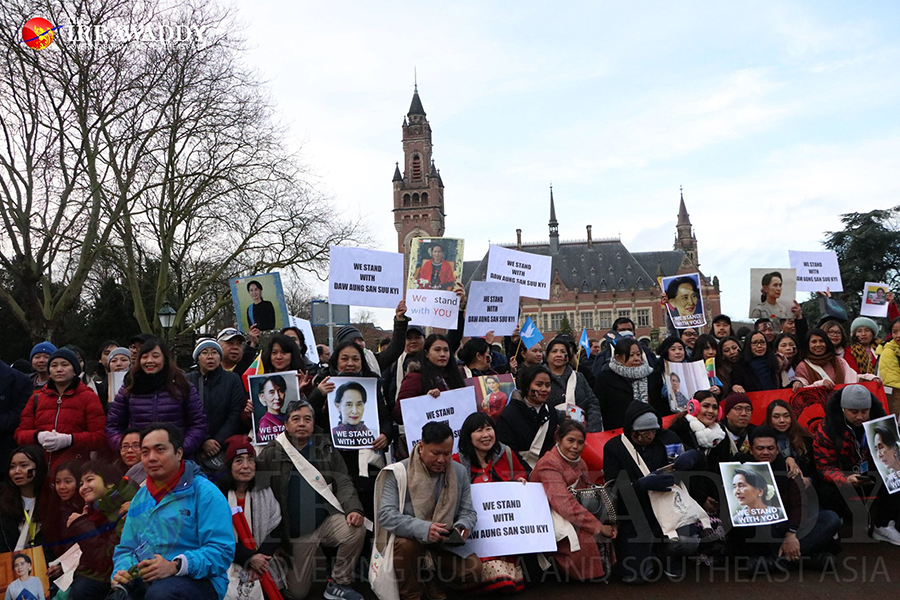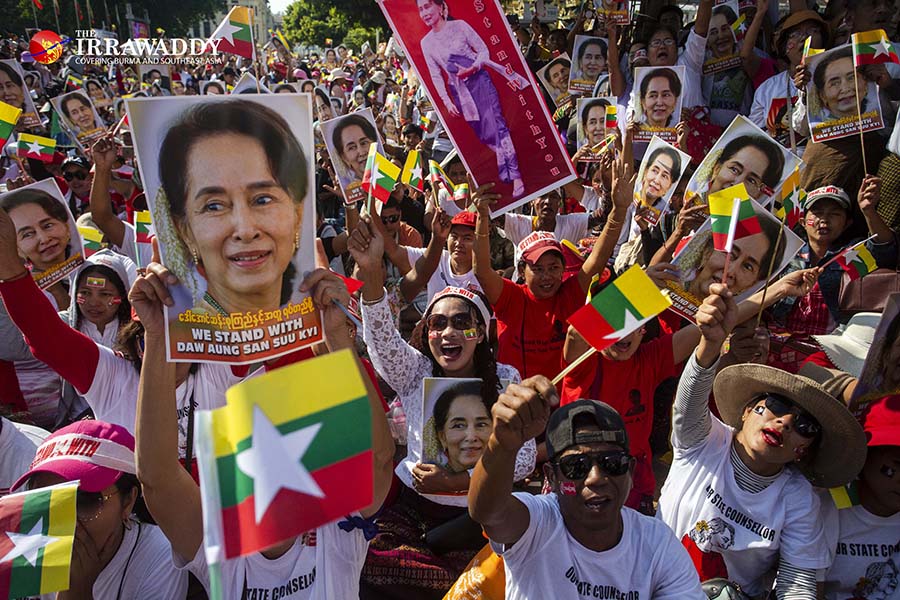It is now part of the world’s politically correct orthodoxy to blame Daw Aung San Suu Kyi for the Rohingya refugee crisis and to condemn her for defending Myanmar against the genocide case brought by Gambia before the International Court of Justice.
Last week in Yangon, I had a conversation with a Western diplomat about Daw Aung San Suu Kyi’s trip to The Hague to face the genocide case brought against Myanmar. He asked me whether I think it is too risky for Daw Suu to defend the military generals. I replied, “Did she say she was defending the generals?”
I’ve had similar conversations with some of my foreign friends. When it comes to the Rohingya crisis, blaming Daw Suu has become fashionable among diplomats and the INGO community in Myanmar. They condemn her whether she remains silent or speaks out. This puzzles me, as it must puzzle anyone who understands Myanmar’s history.
The fashion is doubtless shaped by news headlines and influential global news outlets. A sample of such headlines includes “From Democracy Icon to Genocide Defender,” “Ignoble Laureate,” “Fading Icon,” and the like.
Twenty-eight years ago, the word’s media celebrated Daw Aung San Suu Kyi as a symbol of Myanmar’s new democratic age. For example, during the 1990s, it became politically incorrect for tourists to travel to Myanmar. Daw Suu had urged a tourist boycott to support her condemnation of the military regime. It was headline news around the world. How the times have changed.
Even Daw Aung San Suu Kyi’s lawyer and genocide scholar Professor William Schabas is considered “politically incorrect.” His crime is taking part in the legal team representing Myanmar.
So who, then, are the politically correct? The improbable answer is Gambia, not a country known for its stellar record of human rights, nor as an advocate for minority populations. Gambia is one of the 57 member countries representing the Organization for Islamic Cooperation (OIC). It is accusing Myanmar of genocide against the Rohingya in a case brought before the International Court of Justice (ICJ).
Gambia’s case rests on two key elements, genocidal intent and genocidal acts. Referring mainly to the UN Fact-Finding Mission report, Gambia claimed genocidal intent in the systematic denial of legal rights to the Rohingya. These include restrictions on their ability to marry and bear children, severe restrictions on freedom of movement, including detention camps, and governmental support for, and participation in, pervasive hate campaigns aimed at demonizing and dehumanizing the group.
However, it is puzzling why Gambia omits the fact that this systematic denial of legal rights to the Rohingya was a policy of the former dictators since 1982. It also reflects the unhappy fact that for decades, the UN ignored the Rohingya, as well as other human rights issues in Myanmar. Gambia’s accusation cites the recently elected government as the offender with specific genocidal intent.
Daw Aung San Suu Kyi characterized the Gambian accusation as “an incomplete and misleading factual picture” of the situation in Rakhine State. “The situation in Rakhine is complex and not easy to fathom. But one thing surely touches all of us equally: the suffering of the innocent people whose lives were torn apart as a consequence of the armed conflict of 2016 and 2017, in particular, those who have had to flee their homes are now living in camps in Cox’s Bazar” she said.
The genocidal acts Gambia cites refer to incidents from the October 2016 and August 2017 “clearance operations.” These include the mass executions of Rohingya men, women, and children; the systematic burning of Rohingya villages “with the intent to destroy the group in whole or in part”; the targeting of children; and the commission of rape and sexual violence on a massive scale.
These are indisputably horrific acts. Yet Gambia omits what triggered these incidents; namely, the provocations of the Muslim militant group Arakan Rohingya Salvation Army (ARSA), and its mass killings, forced relocations and sexual violence. These occurred before the Myanmar army ran its clearance operations. Former UN secretary general Kofi Annan, referring to the ARSA attacks, emphasized the perilous situation in Rakhine State: “After years of insecurity and instability, it should be clear that violence is not the solution to the challenges facing Rakhine State.” As violence sweeps through northern Rakhine, Kofi Annan’s recommendations to alleviate the state’s suffering have seemingly been forgotten.

What is almost entirely overlooked by the world’s media is the incipient violence in ARSA’s claim that “Rakhine belongs to Rohingya.” This slogan taps into the legitimate fears of the ethnic Arakanese people, who form the majority along the coastal region of Rakhine State (Rahkine state was formerly officially called Arakan). The Arakanese know what ARSA is capable of.
As for ongoing acts of genocide, Gambia’s application highlights the continuing attacks on the Rohingya, notably the destruction of more than 30 villages between November 2018 and May 2019, denying the Rohingya access to food. It also notes the Fact-Finding Mission’s recent warning that the 600,000 Rohingya still in Myanmar live under the threat of further genocidal acts by Myanmar.
However, what Gambia’s application to the ICJ entirely ignores is Myanmar’s earlier endeavor to find “lasting solutions to the complex and delicate issues in Rakhine state,” through the Advisory Commission led by Dr. Kofi Annan.
Rohingya ethnogenesis
The German sociologist Max Weber famously argued that “primordial phenomena like ethnicity and nationalism would decrease in importance and eventually vanish as a result of modernization, industrialization and individualism.” Many early- to mid-20th-century social scientists shared this view. However, as the Norwegian anthropologist Thomas Hylland Eriksen shows, Weber’s thesis was wrong. Eriksen demonstrates that ethnicity, nationalism and other forms of identity politics grew in political importance after World War II and continue into the 21st century.
Eriksen’s argument helps understand the conflict in Rakhine State, where we can observe the formation of a modern “ethnogenesis,” namely that of “Rohingya,” which displaces the older term, “Bengali.” Rohingya identity formation and the “identity politics” of the Muslim community in northern Rakhine State is one of the factors driving the current crisis. According to Eriksen, the Rohingya ethnogenesis has been developed by many factors, including slavery and capitalism, migration and the consequences of social change for identity formation. Yet as Eriksen observes, whether we employ the name Rohingya or Bengali, this group is “part and parcel of colonialism.”

The international media played a significant role in the politicization of Rohingya ethnicity. The media had uncritically accepted the Rohingya narrative since the refugee exodus in late August 2017. The UN member states rebuked the Myanmar military’s engagement in “ethnic cleansing” against the Rohingya. The Organization of Islamic Cooperation (OIC) drafted the resolution statement, which was adopted by the Human Rights Council on Dec. 5, 2017.
Ironically, the violent acts of the Myanmar military against civilians and other minority ethnic groups have never been brought to the UN Security Council. These outrages were only brought to the world’s attention after UN Secretary General Antonio Guterres labeled the Rohingya exodus, “a textbook example of ethnic cleansing” and UN special rapporteur Yanghee Lee suggested another term, “the hallmarks of genocide.”
However, Professor Schabas argues that the legal term “genocide” needs to be used carefully and in a restricted sense. It should not be used to describe every atrocity involving mass killings.
Politicization of ethnicity
Today, the use of the term “Rohingya” has become a matter of political correctness for international organizations and the international media. The author Jacques Leider writes, “Not calling the Muslims ‘Rohingya’ may be considered, by many activists, as the denial of their self-acclaimed ethno-religious identity and, by extension, a virtual rejection of claims on citizenship.”
Leider further observes that the conventional use of “Rohingya” by international organizations “puts pressure on all the Muslims in Rakhine, especially when they leave the country, to define themselves exclusively as ‘Rohingyas’ for the simple reason that outside of Myanmar, the term has a high value in terms of name recognition.”
The Muslim community in Rakhine State is still a minority group in Myanmar. However, because of the national boundaries between Myanmar and Bangladesh, the Muslim community becomes a majority population near the Bangladesh border. Perhaps this is why they seek a separate Muslim zone by politicizing the Rohingya ethnic identity.
The call for pro-Rohingya groups to set up “a safe zone” for the Rohingya community in Rakhine State echoes the idea of a “separate Muslim zone” demanded by the Mujahidin Muslim militant group in 1948, a few months after Myanmar gained independence.
Genocidal intent or genocidal provocation?
The latest stage of the Rohingya refugee problem includes referring Myanmar to the International Criminal Court to investigate genocide and atrocities against the Rohingyas. The politicization of the Rohingya ethnicity has led to more than 700,000 people fleeing to neighboring Bangladesh.
Myanmar stands accused of genocidal intent, yet the Myanmar army is not the only perpetrator of violence. The ARSA provokes violence and engages in mass killing, and so it too needs to be accounted for in an honest appraisal of any charge of genocide. The provocations of the ARSA and the clearance operation of the Myanmar army are the heads and tails of the same coin. And if the ICJ looks at the perpetrator’s intent for the crime of genocide, then they should also consider the intentions behind the politicizing of ethnicity.
The Muslim community in Rakhine State faces a dilemma. They need to decide whether they should accept their citizenship status as being “Bengali,” that is, of a foreign root, just like Indian and Chinese in Myanmar, or whether they should stick with the politicized identity “Rohingya.” If they continue with the politicized identity “Rohingya,” about 2 million Muslim people will continue to suffer as a stateless community inside Rakhine State and in the refugee camps in Bangladesh.
Mon Mon Myat is a freelance writer/journalist and a graduate student in the PhD program in peace building at Payap University in Chiang Mai, Thailand.
You may also like these stories:
Myanmar Army Plans Rakhine Airstrikes Against Arakan Army
Suu Kyi’s Older Brother Still Disputing Inheritance Decision
Rights Groups Call for Myanmar Boycott Ahead of ICJ Genocide Hearings
















